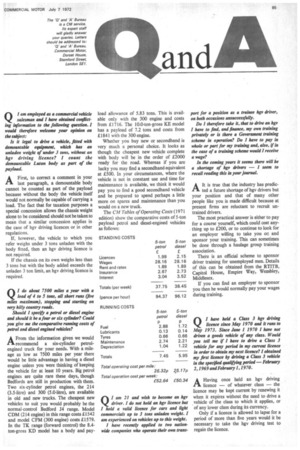Q I am employed as a commercial vehicle salesman and I
Page 87

If you've noticed an error in this article please click here to report it so we can fix it.
have obtained conflicting information to the following question. I would therefore welcome your opinion on the subject:
Is it legal to drive a vehicle, fitted with demountable equipment, which has an unladen weight of under 3 ions, without an hgv driving licence? I count the demountable Luton body as part of the payload.
AFirst, to correct a comment in your last paragraph, a demountable body cannot be counted as part of the payload because without the body the vehicle itself would not normally be capable of carrying a load. The fact that for taxation purposes a special concession allows the chassis weight alone to be considered should not be taken to mein that a similar concession applies in the case of hgv driving licences or in other regulations.
If, however, the vehicle to which you refer weighs under 3 tons unladen with the body fitted, then an hgv driving licence is not required.
If the chassis on its own weighs less than 3 tons but with the body added exceeds the unladen 3 ton limit, an hgv driving licence is required.
QI do about 7500 miles a year with a load of 4 to 5 tons, all short runs (five miles maximum), stopping and starting on very hilly country roads.
Should I specify a petrol or diesel engine and should it be a four or six cylinder? Could you give me the comparative running costs of petrol and diesel engined vehicles?
AFrom the information given we would recommend a six-cylinder petrolengined truck for your needs. With a mileage as low as 7500 miles per year there would be little advantage in having a diesel engine unless you were thinking of keeping the vehicle for at least 10 years. Big petrol engines are quite rare these days, though Bedfords are still in production with them. Two six-cylinder petrol engines, the 214 (3.5-litre) and 300 (5.0-litre), are available in old and new trucks. The cheapest new vehicles to suit you would probably be the normal-control Bedford J4 range. Model CDM (214 engine) in this range costs £1542 and model CFM (300 engine) costs £1579. In the TK range (forward control) the 8.4ton-gross KD model has a body and pay load allowance of 5.83 tons. This is available only with the 300 engine and costs from £1716. The 10.0-ton-gross KE model has a payload of 7.2 tons and costs from £1841 with the 300 engine.
Whether you buy new or secondhand is very much a personal choice. It looks as though the cheapest new vehicle complete with body will be in the order of £2000 ready for the road. Whereas if you are lucky you may find a secondhand equivalent at £500. In your circumstances, where the vehicle is not in constant use and time for maintenance is available, we think it would pay you to find a good secondhand vehicle and be prepared to spend perhaps a little more on spares and maintenance than you would on a new truck.
The CM Tables of Operating Costs (1971 edition) show the comparative costs of 5-ton payload petrol and diesel-engined vehicles as follows: QI am 21 and wish to become an hgv driver. I do not hold an hgv licence but I hold a valid licence for cars and light commercials up to 3 tons unladen weight. am experienced on vehicles up to this weight.
I have recently applied to two nationwide companies who operate their own trans
port for a position as a trainee hgv driver, on both occasions unsuccessfully.
Do I therefore take it, that to drive an hgv I have to find, and finance, my own training privately or is there a Government training scheme in operation? Do I have to pay in whole or part for my training and, also, '0" in the case of a training scheme would I receive a wage?
In the coming years it seems there will be a shortage of hgv drivers I seem to recall reading this in your journal.
Ait is true that the industry has predicted a future shortage of hgv drivers but your position and that of many other people like you is made difficult because at present firms are reluctant to recruit untrained drivers.
The most practical answer is either to pay for a course yourself, which could cost anything up to £200, or to continue to look for an employer willing to take you on and sponsor your training. This can sometimes be done through a haulage group training association.
There is an official scheme to sponsor driver training for unemployed men. Details of this can be obtained from the RTITB, Capitol House, Empire Way, Wembley, Middlesex.
If you can find an employer to sponsor you then he would normally pay your wages during training.
I have held a Class 3 hgv driving licence since May 1970 and it runs to May 1973. Since June 1 1970 I have not driven a goods vehicle of any class. Would you tell me if I have to drive a Class 3 vehicle for any period in my current licence in order to obtain my next licence? obtained my first licence by driving a Class 3 vehicle in the specified qualVying period February 2,1969 and February 1, 1970.
AHaving once held an hgv driving licence of whatever class the licence may be kept current by renewing it when it expires without the need to drive a vehicle of the class to which it applies, or of any lower class during its currency.
Only if a licence is allowed to lapse for a period of more than five years would it be necessary to take the hgv driving test to regain the licence.
















































































































































